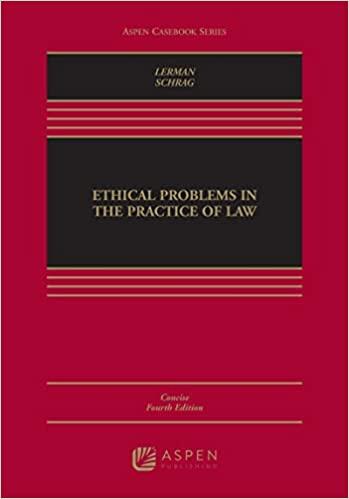Question
write case brief and answer the question on Windsor v. State of Alabama . I.Opinion Harvey Lee Windsor was convicted of capital murder under 13A-5-40(a)
write case brief and answer the question onWindsor v. State of Alabama.
I.Opinion
Harvey Lee Windsor was convicted of capital murder under 13A-5-40(a) (2), Ala. Code 1975, and was sentenced to death by electrocution. Windsor appealed the conviction and sentence to the Court of Criminal Appeals. That court reversed the conviction and remanded for a new trial, holding that the prosecutor had improperly referred to Windor's failure to testify at trial and holding that the circuit clerk's practice of excusing potential jurors to whom jury service would prove burdensome constituted reversible error. We granted certiorari review. We reverse the judgment of the Court of Criminal Appeals and remand the case to that court for action consistent with this opinion.
II.Discussion
During closing argument, the following exchange occurred:
[Prosecution]: An intentional act[the Judge] will tell you a person acts intentionally if his purpose is to cause that result or to engage in that con-duct. That intent, whether Mr. Harvey Lee Windsor pulled the trigger of that sawed-off shotgun or whether Colan Lavon Guthrie did it, is still there. The intent to kill. Intent is a state of mindsome-thing that is rarely capable of positive proof. I expect the Judge will tell you that. If we could get into that mind over there and put out here what is in there, we would have no reason for a jury.
Defense counsel]: Object, that is improper argument.
[The Court]: Overruled.
[Prosecution]: I'll tell you that he did have the intent to kill. If you find the intent to kill, there can be but one verdict. The state of mindnot capable of positive proof. How can you decide what his intent was? We have to proveto find him guilty of capital murderthe intent. Intent can be inferred from his actions. Judge Austin will tell you in his charge that the intent can be inferred from his actions. Let's look at his actions. What did he do? How do we decide his intent? What are his actions?
As this Court recently held in Ex parte Musgrove, "[w]hen an accused contends that a prosecutor has made improper comments during a closing argument, the statements at issue must be viewed in the context of the evidence presented in the case and the entire closing arguments made to the jury . . . ." Washington v. State, 259 Ala. 104, 65 So. 2d 704 (1953). In this case, the prosecutor was explaining the difference between felony murder and capital murder, and arguing that the State had proven Windsor guilty of capital murder. In order to do so, the State had to prove Windsor's intent to kill.
In this narrow context, it is apparent that the prosecutor was referring not to Windsor's failure to testify, but rather to the State's own failure to produce direct evidence of Windsor's intent. The only way for the State to prove intent, and, therefore, to obtain a conviction on the capital murder charge, was to show that Windsor acted in accordance with an intent to kill. In a certain sense, what the prosecutor said was true. To mangle the maxim, it could be said that were we able to peer into the hearts of men, there would be no question of fact to be resolved by the jury concerning the specific issue of the defendant's state of mind at the time of the offense. However, resolution of that specific issue is certainly not the full extent of the jury's function, and even indirect comments on an accused's failure to testify have the potential to be highly prejudicial to the defense. Musgrove.
Alabama, by statute, specifically protects the privilege against self-incrimination from comment by the prosecution. 12-21-220, Ala. Code 1975. A prosecutor must be extremely careful not to overstep the mark or to break with the established protocol regarding statements about that privilege. Musgrove. To improperly comment on that privilege would be a clear violation of the defendant's rights under Article I, 6, Ala. Const. 1901, as well as the rights protected by the Fifth Amendment as that Amendment is incorporated into the Fourteenth Amendment to the United States Constitution.
In Ex parte Wilson, 571 So. 2d 1251, 1261 (Ala. 1990), this Court cited the standard endorsed by the United States Court of Appeals for the Eleventh Circuit:
[A] statement by a prosecutor is improper if it was manifestly intended to be, or was of such a character that the jury would naturally and necessarily take it to be, a comment on the failure of the accused to testify. Marsden v. Moore, 847 F.2d 1536, 1547 (11th Cir.), cert. denied, 488 U.S. 983, 109 S. Ct. 534, 102 L. Ed. 2d 566 (1988).
We cannot say that the statement made in this case was intended to be a remark on Windsor's failure to testify; nor can we conclude that the natural and necessary reaction of the jury would be to conclude that the prosecutor was referring to Windsor's failure to take the stand in his own defense. We hold that the trial court properly overruled the objection to the prosecutor's statement.
Case Analysis
1. What is the legal issue before the court?
2. When is a statement by a prosecutor improper?
Step by Step Solution
There are 3 Steps involved in it
Step: 1

Get Instant Access to Expert-Tailored Solutions
See step-by-step solutions with expert insights and AI powered tools for academic success
Step: 2

Step: 3

Ace Your Homework with AI
Get the answers you need in no time with our AI-driven, step-by-step assistance
Get Started


